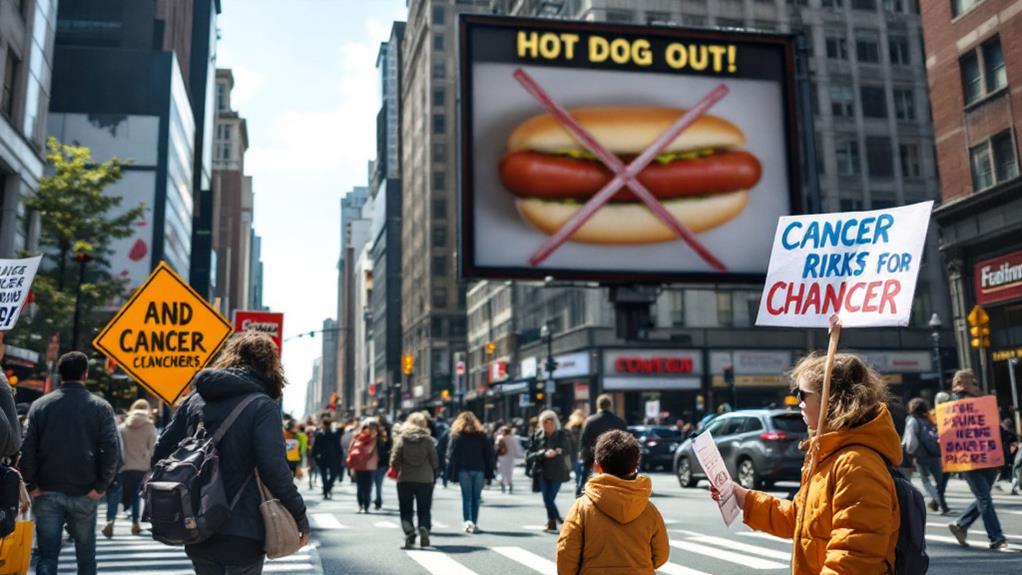Hot Dogs Take a Hit: The Link Between Processed Meat and Cancer Risk

You're consuming hot dogs, but be cautious! They're classified as Group 1 carcinogens by the International Agency for Research on Cancer. Eating just 3.5 ounces daily can spike your colorectal cancer risk by 36%. Those harmful nitrates in processed meats turn into nitrites, damaging your gut lining and increasing cancer risk. Nitrate-free labels? Not a guaranteed safe bet. However, there's hope in making smarter choices. Opt for skinless poultry or fish instead and keep red meat to 18 ounces weekly. Welcome meat-free days and include fiber-rich treats like fruits and veggies. There's much more to understand about reducing your risk.
Understanding Processed Meats
Processed meats, often found in everyday meals, are meats preserved through methods like smoking, curing, and the inclusion of chemical preservatives. These include popular items like bacon, deli meats, and sausages. The International Agency for Research on Cancer (IARC) has classified processed meats as Group 1 carcinogenic, meaning there's sufficient evidence that processed meat causes colorectal cancer. This classification highlights a direct link between processed meat consumption and increased cancer risk.
When you consume processed meats, you're also ingesting chemicals like nitrates and nitrites. These additives can transform into harmful compounds in your body, especially when consumed frequently or in large quantities. High consumption of red meat, particularly processed forms, has been linked to a significant increase in colorectal cancer risk—up by 18% with a daily intake of just 50 grams.
Beyond cancer, processed meats pose other health complications. They're typically high in sodium and saturated fats, which contribute to obesity and cardiovascular disease. Understanding the risks associated with processed meats is essential for making informed dietary choices and protecting your long-term health. Reducing processed meat intake can be an important step toward minimizing these risks.
Cancer Risks of Hot Dogs
The reality of consuming hot dogs often includes more than just enjoying their savory taste; it involves a potential cancer risk. Hot dogs fall under the category of processed meats, which the World Health Organization (WHO) has classified as carcinogenic. This classification means that your consumption of hot dogs can lead to an increased risk of colorectal cancer. In fact, regular intake of processed meats, including hot dogs, raises this risk by 36% for every 3.5 ounces consumed daily. Such statistics highlight the significant cancer risk linked to these popular snacks.
Moreover, there's more to worry about than just colorectal cancer. Consuming just half a hot dog daily has been associated with a 21% increase in breast cancer risk. The American Institute for Cancer Research (AICR) underscores the importance of limiting processed meat consumption, emphasizing that no safe level of intake has been identified. High consumption of processed meats like hot dogs can lead to the formation of harmful chemicals. These chemicals have the potential to damage your gut lining and promote cancer conditions. Given these risks, it's crucial to evaluate your hot dog consumption and consider healthier alternatives.
The Role of Nitrates

Among the diverse factors contributing to the cancer risk of processed meats, nitrates play a significant role. When you consume processed meats like hot dogs, you're also ingesting nitrates. These compounds can convert into nitrites, which might harm your gut lining. This damage creates an environment conducive to cancer development, particularly increasing the risk of colorectal cancer. It's vital to understand that even if a product is labeled "nitrate-free," it doesn't guarantee you're safe. Your body can naturally convert other ingredients into nitrites, posing similar health threats.
Regular consumption of processed meats high in nitrates and nitrites has been linked to a heightened risk of colorectal cancer. This underscores the importance of being mindful about your dietary choices. While you may think that opting for uncured meats is safer, studies reveal that cured and uncured meats can have similar levels of these harmful compounds. It's a common misconception that absence of additives equals safety.
Interestingly, nitrates in vegetables like spinach don't have the same negative effects. Plants contain protective chemicals that counteract the harmful impacts of nitrates, setting them apart from their processed counterparts. So, it's wise to be cautious about processed meat consumption.
Healthier Meat Choices
In regard to making healthier meat choices, many find that opting for skinless poultry, tuna, and fish can greatly lower cancer risk while still providing essential nutrients. These options serve as healthier alternatives to processed meat, which is often linked to increased cancer risk. Reducing your consumption of red meat is another effective strategy. Aim for no more than 18 ounces per week to help mitigate colorectal cancer risk. Prioritize lean cuts of beef, turkey, and chicken, and confirm you read labels carefully to avoid processed meats laden with harmful additives like nitrates and nitrites.
Incorporating meat-free days into your routine can also enhance your health by reducing your reliance on processed meat. These days offer an opportunity to investigate fiber-rich foods such as fruits and vegetables, which are beneficial for your digestive health and can further reduce cancer risk. When you do consume deli meats, opt for fresh over prepackaged varieties, as they typically contain fewer preservatives. By making these changes, you can enjoy the health benefits of a balanced diet while minimizing the risks associated with processed and red meat consumption.
Dietary Adjustments for Risk Reduction

Kick off your expedition to reducing cancer risk by making simple dietary adjustments that can have a big impact. Start by limiting processed meat consumption. Eating just 50g of processed meat daily can raise your colorectal cancer risk by 18%, so cutting back is vital. Instead, try incorporating lean cuts of turkey, chicken, and fish into your meals. These alternatives not only reduce your exposure to harmful preservatives and carcinogens but also offer a healthier protein source.
Another important strategy is practicing moderation in dietary habits, particularly with red meat. Health organizations suggest keeping your red meat intake to no more than 18 ounces per week to help reduce cancer risk. Welcome meat-free days by diving into plant-based meals, which promote a balanced diet and greatly cut down the risks linked to processed meat and high meat diets.
Moreover, make fiber-rich foods like fruits and vegetables a staple in your daily diet. These foods are fundamental for general health and can help mitigate the cancer risks associated with high meat consumption. By making these adjustments, you're not just reducing cancer risk but also adopting a healthier lifestyle.
Insights From Scientific Research
Scientific research provides compelling evidence about the risks of consuming processed meats. Regular consumption of processed meats like hot dogs considerably increases the risk of colorectal cancer. The International Agency for Research on Cancer (IARC) classifies processed meat as Group 1 carcinogenic, which means there's sufficient evidence linking it to cancer, particularly colorectal cancer. Epidemiological studies highlight that eating as little as 50 grams of processed meat daily can increase your cancer risk by 18%.
Moreover, a 2021 Harvard study found a direct connection between red and processed meat consumption and DNA damage, a precursor to cancer development. High-temperature cooking methods exacerbate the issue, as meats cooked at high temperatures can produce carcinogenic compounds. These findings underscore the considerable health implications of regularly consuming processed meats.
Reducing intake of processed and red meats can help prevent cancer. Being aware of how meat causes colorectal cancer underscores the importance of making informed dietary choices. By choosing healthier alternatives and understanding the risks associated with high-temperature cooking, you can take proactive steps to lower your cancer risk and promote better long-term health.
Public Awareness and Campaigns

Amid growing concerns about the health risks of processed meat consumption, public awareness campaigns are playing a crucial role in educating people. The Physicians Committee for Responsible Medicine (PCRM) has creatively drawn attention to the cancer risks of processed meat, especially hot dogs, by comparing them to cigarettes. These campaigns highlight the increased risk of colorectal cancer linked to processed meats, a classification supported by the World Health Organization.
Billboards and social media are key tools in these efforts, emphasizing the significance of making healthier dietary choices. By presenting the dangers of processed meat in a straightforward manner, these campaigns aim to shift public perception and behaviors. Public health initiatives rely heavily on scientific evidence, such as the findings from the Continuous Update Project (CUP), to back their claims. This guarantees that the information reaching you is credible and fact-based.
Media attention amplifies these campaigns, helping to spread awareness about the cancer risks associated with processed meat consumption. As you learn more about these risks, you're prompted to reconsider your dietary habits, potentially choosing options that lower your risk of colorectal cancer and improve general public health.
Community and Individual Actions
Building on the momentum of public awareness campaigns, communities and individuals are taking concrete steps to address the cancer risks linked to processed meats. You're seeing community-led initiatives that emphasize education about the health risks of processed meats, likening them to the known dangers of smoking. These efforts highlight the significance of making informed dietary choices to support cancer prevention.
Financial constraints often lead you to prioritize processed meats, which are affordable but unhealthy. Community discussions are essential in pointing out the need for accessible, healthy food options. By advocating for local markets or community gardens, you're ensuring everyone has access to nutritious alternatives that can replace processed meats in everyday meals.
Organizations promote plant-based diets as a viable way to lower cancer risk. You're encouraged to try incorporating more plant-based meals into your diet, perhaps starting with meatless days each week. This small change can lead to significant health benefits and supports broader community health initiatives.
Ultimately, these collective actions and individual choices contribute to a healthier community. By focusing on prevention and making conscious dietary changes, you're actively reducing cancer risk and fostering a supportive environment for health-focused living.




